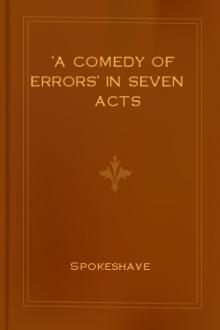Tales of St. Austin's by P. G. Wodehouse (unputdownable books .TXT) 📖

- Author: P. G. Wodehouse
Book online «Tales of St. Austin's by P. G. Wodehouse (unputdownable books .TXT) 📖». Author P. G. Wodehouse
Charteris had no such scruples. The feeling of fatigue that had been upon him had vanished, and his temper, which had been growing steadily worse for some twenty minutes, now boiled over gleefully at the prospect of something solid to work itself off upon. Even without a cause Charteris detested the Rural Hooligan. Now that a real, copper-bottomed motive for this dislike had been supplied to him, he felt himself capable of dealing with a whole regiment of the breed. The criminal with the bicycle had just let it fall with a crash to the ground when Charteris went for him low, in the style which the Babe always insisted on seeing in members of the First Fifteen on the football field, and hove him without comment into a damp ditch. 'Charles his friend' uttered a shout of disapproval and rushed into the fray. Charteris gave him the straight left, of the type to which the great John Jackson is reported to have owed so much in the days of the old Prize Ring, and Charles, taking it between the eyes, stopped in a discouraged and discontented manner, and began to rub the place. Whereupon Charteris dashed in, and, to use an expression suitable to the deed, 'swung his right at the mark'. The 'mark', it may be explained for the benefit of the non-pugilistic, is that portion of the anatomy which lies hid behind the third button of the human waistcoat. It covers—in a most inadequate way—the wind, and even a gentle tap in the locality is apt to produce a fleeting sense of discomfort. A genuine flush hit on the spot, shrewdly administered by a muscular arm with the weight of the body behind it, causes the passive agent in the transaction to wish fervently, as far as he is at the moment physically capable of wishing anything, that he had never been born. 'Charles his friend' collapsed like an empty sack, and Charteris, getting a grip of the outlying portions of his costume, dragged him to the ditch and rolled him in on top of his friend, who had just recovered sufficiently to be thinking about getting out again. The pair of them lay there in a tangled heap. Charteris picked up the bicycle and gave it a cursory examination. The enamel was a good deal scratched, but no material damage had been done. He wheeled it across to its owner.
'It isn't much hurt,' he said, as they walked on slowly together. 'Bit scratched, that's all.'
'Thanks awfully,' said the small lady.
'Oh, not at all,' replied Charteris. 'I enjoyed it.' (He felt he had said the right thing there. Your real hero always 'enjoys it'.) 'I'm sorry those bargees frightened you.'
'They did rather. But'—she added triumphantly after a pause—'I didn't cry.'
'Rather not,' said Charteris. 'You were awfully plucky. I noticed. But hadn't you better ride on? Which way were you going?'
'I wanted to get to Stapleton.'
'Oh. That's simple enough. You've merely got to go straight on down this road, as straight as ever you can go. But, look here, you know, you shouldn't be out alone like this. It isn't safe. Why did they let you?'
The lady avoided his eye. She bent down and inspected the left pedal.
'They shouldn't have sent you out alone,' said Charteris, 'why did they?'
'They—they didn't. I came.'
There was a world of meaning in the phrase. Charteris felt that he was in the same case. They had not let him. He had come. Here was a kindred spirit, another revolutionary soul, scorning the fetters of convention and the so-called authority of self-constituted rules, aha! Bureaucrats!
'Shake hands,' he said, 'I'm in just the same way.'
They shook hands gravely.
'You know,' said the lady, 'I'm awfully sorry I did it now. It was very naughty.'
'I'm not sorry yet,' said Charteris, 'I'm rather glad than otherwise. But I expect I shall be sorry before long.'
'Will you be sent to bed?'
'I don't think so.'
'Will you have to learn beastly poetry?'
'Probably not.'
She looked at him curiously, as if to enquire, 'then if you won't have to learn poetry and you won't get sent to bed, what on earth is there for you to worry about?'
She would probably have gone on to investigate the problem further, but at that moment there came the sound of a whistle. Then another, closer this time. Then a faint rumbling, which increased in volume steadily. Charteris looked back. The railway line ran by the side of the road. He could see the smoke of a train through the trees. It was quite close now, and coming closer every minute, and he was still quite a hundred and fifty yards from the station gates.
'I say,' he cried. 'Great Scott, here comes my train. I must rush. Good-bye. You keep straight on.'
His legs had had time to grow stiff again. For the first few strides running was painful. But his joints soon adapted themselves to the strain, and in ten seconds he was sprinting as fast as he had ever sprinted off the running-track. When he had travelled a quarter of the distance the small cyclist overtook him.
'Be quick,' she said, 'it's just in sight.'
Charteris quickened his stride, and, paced by the bicycle, spun along in fine style. Forty yards from the station the train passed him. He saw it roll into the station. There were still twenty yards to go, exclusive of the station's steps, and he was already running as fast as it lay in him to run. Now there were only ten. Now five. And at last, with a hurried farewell to his companion, he bounded up the steps and on to the platform. At the end of the platform the line took a sharp curve to the left. Round that curve the tail end of the guard's van was just disappearing.
'Missed it, sir,' said the solitary porter, who managed things at Rutton, cheerfully. He spoke as if he was congratulating Charteris on having done something remarkably clever.
'When's the next?' panted Charteris.
'Eight-thirty,' was the porter's appalling reply.





Comments (0)